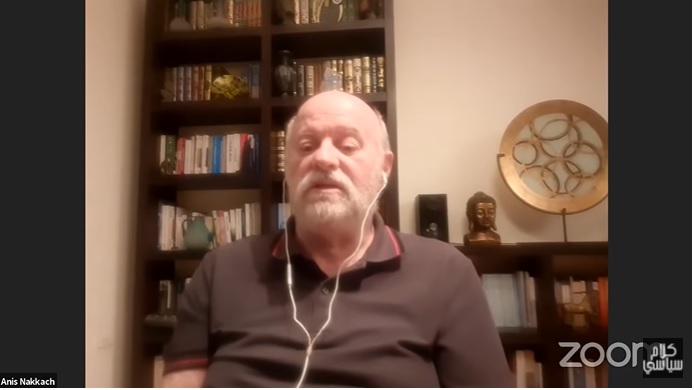
Description:
In a recent conference held on Zoom and published on YouTube, senior Middle East political analyst Anees Naqqash spoke about his 2014 book titled The Levantine Confederation: The Battle of Identities and Policies.
The book proposes that the solution to the chronic problems of the war-ravaged and tumultuous Middle East region lies in the establishment of a confederation that unites the states of the Levant, or what Naqqash often calls the ‘West Asian region’.
Middle East Observer will gradually be publishing English translations of the author’s online talk over several posts. The following is Part Two.
To read Part One first see here.
Source: Kalam Siyasi (YouTube Channel)
Date: Aug 26, 2020
(Important Note: Please help us keep producing independent translations for you by contributing as little as $1/month here)
Transcript :
Anees Naqqash:
The other reason behind this explosion in the region, which I consider the major reason, is the American decision to topple and occupy Iraq with the following objectives: 1) to take over the oil wells that America was highly in need of at that time; 2) to weaken all ideas that relate to supporting the Palestinian cause and the potential for alliances or agreements between Arab states. In this regard, (the Americans) wrote (at the time) that they seek to weaken what they call the ‘Arab nationalism’. They thought that by the fall of Baghdad, Syria and the Palestinians, the remaining states will toe the line when it comes to the American will in shaping a new Middle East.
Therefore, the first reason behind this security explosion that has occurred is the American attack (on the region); and the second reason relates to the inherited quasi-national identities, territorial divisions, and sectarian and religious identities that spur (each sect) – when the main body of the state breaks down – to take up their positions, in fear of any significant incidents and disturbances that may occur, while external and Western powers work on heightening these tensions by (carrying out) secret plans that trigger strife and shatter the nation (Ummah), as is happening today.

Based on this background, we began to look for a solution to this crisis in order to resolve this great impasse. It was possible for one to review and re-present the concept of ‘Arab nationalism’ from the Nasserist, Baathist or Arab nationalist point of views, yet these proposals have demonstrated over the last 40 or 45 years, their failure in uniting the Arab nation; in building a viable socialist system for (Arab) society; and in liberating Palestine, as (these political theories) had vowed and committed to do. Therefore, these theories began to suffer from weakness, and all the so-called ‘Arab nationalist’ powers in the region have fallen.
The Islamic movements that emerged, particularly after the victory of the Islamic Revolution in Iran, witnessed a great revival throughout all Islamic regions. Islamic political thought began to develop following the huge victory that was achieved in Tehran. However, it developed gradually. Firstly, it developed in terms of (its various) sectarian identities, a large part of which were kept under the control of the West that used them in the conflict with Communism, which led in turn to the (establishment) of an ‘Islamic jihad’ so to speak – that was controlled and directed by Western powers according to grandiose strategic schemes. There is also (various types of) limited, localised, Islamic (socio-political) action that does not live up to the (requirements and level of) the nation. There is also Islamic charitable work and projects that do not reach a level that can be deemed Islamic political action.
Thus, in the face of the onslaught of new global ideas, such as globalization…(consider) Europe, which has united, and which (poses) a new challenge to political thought. The European model has challenged and crushed the struggle of nationalities (phenomenon) which triggered the two world wars; the unity of Europe and its (new model) proved that nationalities can unite under an economic project that is able to save the peoples of Europe and preclude them from poverty at a time of US and Chinese (dominance). This means that (common) interest has united (Europeans) and turned them into the third economic power of the world.
This European challenge proved that the coexistence of multiple languages and cultures upon which nationalities are built can possibly create a broader identity, which they call the ‘European identity’. So, this European challenge offered humanity a new model unlike what we used to think i.e. unity and national identities are only established among those who speak the same language and share the same culture. We see a new model that has strong influence in the world.
The imperial powers that dominate the world themselves present totally different model(s) to all that which we have inherited of ideological and political thought. We have remarkable examples of this type, such as the example of the global migration to new continents, in which the migration of people to North and South America have established two types of states: weak and failed states, and the United States of America, a very powerful state that has dominated the world’s capabilities economically, and militarily controlled many regions with no power managing to arise as a (serious) competitor. This state (US) that came into existence via the (efforts of) scattered peoples from across the world, is comprised today of all the world’s ethnicities, colors and religions, (a state) in which the president – who holds the highest position at the White House – can be a black person of African descent, i.e. not a hundreds of years (American) descent but a person of a foreign father who is only he himself born in the United States.
Consequently, we notice that part of the crises that the US is suffering from today is related to its multiple identities, but at the same time, America has achieved its greatness through this economic power that has gathered the world’s finest minds in relation to economic, technical and creative matters. Actually, when he wrote his book in 1975, ‘(America) Between Two Ages’, Brzezinski admitted that 80% of the technical, engineering and scientific minds in the United States are actually ‘imported minds’ from around the world. This means that the United States has provided us with a model that says: a state which has law and order, and that provides a certain type of comfortable lifestyle (for its citizens), (such a state) can possibly become a magnet for the globe’s brains, such that they leave their miserable countries of origin and migrate to it. This thus becomes a dialectical relationship – that third-world states nurture the great imperial power of the globe with their home-grown brainpower and capabilities.
Continue to part 3
——
Subscribe to our mailing list!

Leave a Reply